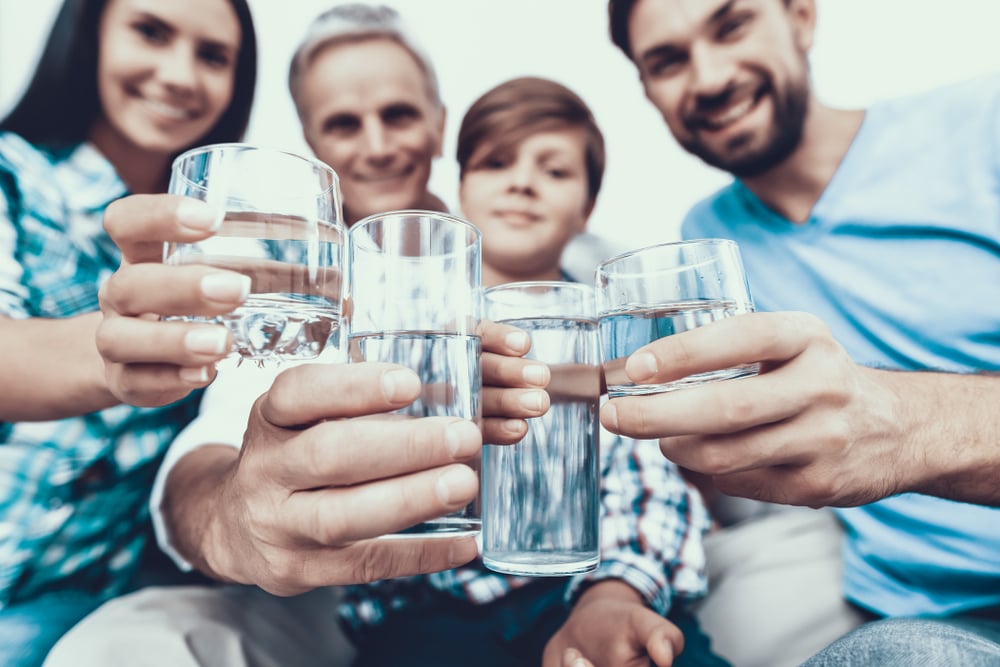
The summer heat is in full force, which means it’s even more important to keep your body hydrated. We all know that we need water to survive, but do you know how much water you should be drinking every day for optimal health? There are a lot of voices out there telling us what kind of water to drink and how much to drink each day. But how do you know which voices to listen to? We did some research of our own and came up with the best practices to keep you healthy and hydrated.
Dehydration happens when your body doesn’t have as much water as it needs. It’s important to recognize the signs of dehydration. Then we’ll discuss how you can avoid becoming dehydrated in the first place.
Signs you are dehydrated include:
- Thirst
- Dry mouth
- Headache
- Fatigue
- Dizziness or fainting
- Dry skin
- Urinating less often
- Dark or “neon” urine
- Muscle cramping
Anyone can become dehydrated, but some are more susceptible, such as babies and young children, older adults, people who are sick, people with a chronic disease, or people who are more active outside, especially in hot and humid weather.
How much water should you drink every day?
The key to staying hydrated is drinking enough fluids, and there is nothing better for you than drinking water. But how much water should you drink? It’s a simple question, but not an easy answer.
You’ve probably heard the advice to drink 8 glasses of water a day, or to drink half your body weight in ounces each day or that if you’re thirsty you’re already dehydrated. How do you know which piece of advice to follow? Well, it depends!
Lifestyle has a big part to do with how much water you should be drinking, such as:
- Exercise – if you’re doing activity that makes you sweat, you’ll need to drink more water to replace the fluids lost.
- Weather – hot or humid weather can also cause you to lose more fluid than normal, so you’ll need to drink more water in hot or humid environments.
- Health – when you’re sick – especially if you have a fever, diarrhea or are vomiting – you will lose more fluid faster and need to drink extra water.
- Pregnancy – when you’re pregnant or breastfeeding your body needs more fluids to stay hydrated.
As a general rule, the Mayo Clinic sites that The U.S. National Academies of Sciences, Engineering, and Medicine determined that an adequate daily fluid intake is:
- About 15.5 cups (3.7 liters) of fluids a day for men
- About 11.5 cups (2.7 liters) of fluids a day for women
These recommendations cover fluids from water, other beverages and food. About 20% of daily fluid intake usually comes from food and the rest from drinks.
What are other sources that can keep me hydrated?
Water isn’t the only option that contributes to your hydration. What you eat can also add to your hydration too. For example, foods such as watermelon and spinach, beverages such as milk, juice and herbal teas, even coffee, are all composed of mostly water.
Just watch your intake of soda, energy or sports drinks because these usually contain a lot of sugar. Sugary drinks can lead to weight gain, inflammation, an increased risk of developing diabetes, and affect your quality of sleep. Water is still the best source to keep you hydrated!
Can I drink too much water?
Drinking too much water is rarely a problem. If you’re an athlete participating in long or intense training sessions, it could happen, but it’s not likely.
Benefits of drinking water
We know that water is essential to living, but what benefits does it have, really? Water keeps every system in our body functioning correctly. Harvard Health reports the many roles of water, including:
- carrying nutrients and oxygen to your cells
- flushing bacteria from your bladder
- aiding digestion
- preventing constipation
- normalizing blood pressure
- stabilizing the heartbeat
- cushioning joints
- protecting organs and tissues
- regulating body temperature
- maintaining electrolyte (sodium) balance
The best thing you can do for yourself to stay hydrated is to consistently drink water throughout the day. If you start feeling dehydrated fill a glass of water and think of all the amazing benefits it has for your body.
Drinking water, physical activity, and nutrition are all key components of living a healthy lifestyle. If you think you’re drinking an adequate amount of water, but are still experiencing the signs of dehydration or other health issues, visit us at Orchard Hospital.



